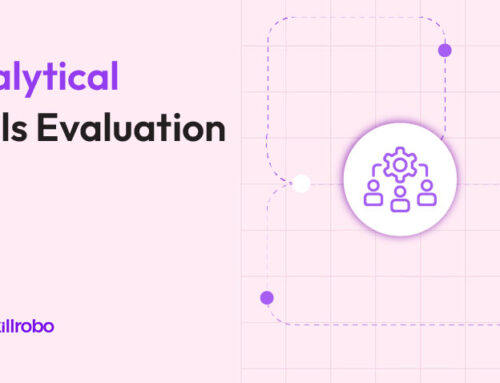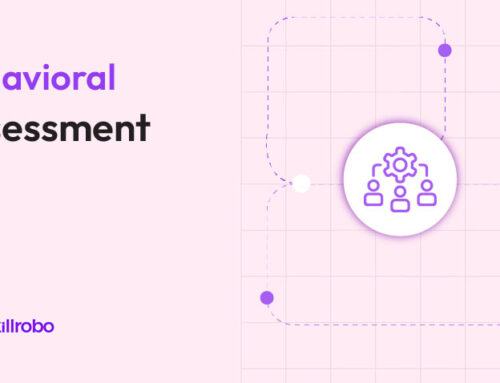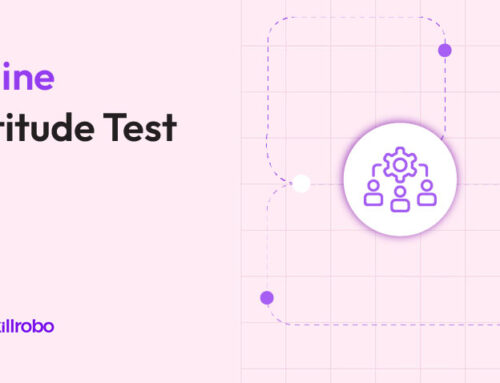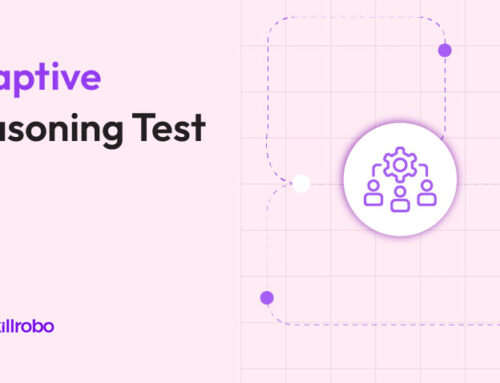Table of Contents
Related articles

Key Takeaways
- The Dark Triad Test identifies narcissism, Machiavellianism, and psychopathy, revealing traits that disrupt workplace dynamics.
- These traits—self-centeredness, manipulation, and lack of empathy—harm team morale and productivity.
- Identifying Dark Triad individuals helps enterprises foster healthier environments through targeted interventions.
- Skillrobo’s assessments detect these traits, aiding in ethical, effective hiring decisions.
As a corporate professional, you must have encountered individuals who engage in unethical practices, manipulate others, and display a lack of empathy. These individuals may seem charming and charismatic on the surface, but underneath, they possess dark personality traits that can significantly impact workplace dynamics and productivity. The Dark Triad Test is a tool that can help identify these traits and pave the way for a more productive and healthy work environment.
The test has three negative personality traits: narcissism, Machiavellianism, and psychopathy. It is designed to identify individuals who exhibit these traits and predict their behavior in different situations. This article will guide you through the test and its significance in the workplace.
What is the Dark Triad?
The Dark Triad is a combination of three personality traits that are characterized by manipulation, self-centeredness, and a lack of empathy. Narcissism is characterized by a grandiose sense of self-importance, a need for admiration, and a lack of empathy. Machiavellianism is characterized by a willingness to manipulate others for personal gain, a lack of morality, and a focus on self-interest. Psychopathy is characterized by impulsivity, a lack of remorse or guilt, and a disregard for social norms and rules.
The Three Personality Traits of the Dark Triad –
The Dark Triad comprises narcissism, Machiavellianism, and psychopathy—traits defined by manipulation and self-interest. Understanding them reveals their workplace impact, guiding better management and team dynamics.
Narcissism –
It is characterized by an inflated sense of self-importance, a need for admiration, and a lack of empathy. Narcissistic individuals often believe that they are superior to others and may be preoccupied with fantasies of power and success. In the workplace, narcissistic individuals may be seen as arrogant and difficult to work with.
They may be more focused on their success than the success of the team and may be unwilling to collaborate or compromise. The dark triad test measures an individual’s level of narcissism, which is characterized by an inflated sense of self-importance, a lack of empathy for others, and a preoccupation with one’s desires and needs.
Machiavellianism –
It is defined by a tendency to manipulate others for personal advantage, a lack of morals, and a concentration on self-interest. Individuals with high levels of Machiavellianism may be charming and charismatic, but they are often deceptive and manipulative. They may use their skills to gain power and control over others and may be willing to engage in unethical behavior to achieve their goals. In the workplace, individuals with high levels of Machiavellianism may be seen as untrustworthy and may be more likely to engage in unethical or illegal behavior.
Psychopathy –
Psychopathy is characterized by impulsivity, a lack of remorse or guilt, and a disregard for social norms and rules. Although psychopathic people might be attractive and charismatic, they frequently lack empathy for others. They might behave recklessly and might be more inclined to commit crimes.
Psychopathic people may be perceived as impulsive and unpredictable at work and may be more likely to act unethically. The dark triad psychology test measures an individual’s level of psychopathy, which is characterized by a lack of empathy, impulsivity, and a tendency towards antisocial behavior.
Individuals who exhibit these traits are often charming and charismatic on the surface, but their behavior can be manipulative, self-centered, and lacking in empathy. They may engage in unethical practices, lie, cheat, and exploit others for personal gain.
How the Dark Triad Traits Manifest in the Workplace?
The Dark Triad traits can manifest in various ways in the workplace. Individuals with high levels of narcissism may seek attention and praise from others, take credit for the work of others, and engage in self-promotion. Individuals with high levels of Machiavellianism may manipulate others, engage in unethical practices, and seek to advance their interests.
Individuals with high levels of psychopathy may engage in impulsive and reckless behavior, disregard rules and norms, and lack remorse or guilt. And also identifying individuals with dark personality traits in the workplace can be challenging; that is where the dark triad test comes in. However, some warning signs may indicate that an individual has dark personality traits. These include:
- A lack of empathy for others
- A desire for power and control
- A willingness to manipulate and exploit others
- Arrogance and a sense of entitlement
- A tendency towards impulsivity and risk-taking
- A lack of remorse or guilt
If you suspect that an individual in your workplace may have dark personality traits, it is important to address the issue as soon as possible. This may involve speaking with a supervisor or HR representative or even seeking the assistance of a mental health professional.
The behavior of individuals with Dark Triad traits can significantly impact workplace dynamics and productivity. They may create a toxic work environment, reduce team morale, and negatively impact the performance of the team.
Impact of Dark Triad Traits on Workplace Dynamics and Productivity
The impact of Dark Triad traits on workplace dynamics and productivity can be significant. Individuals with high levels of these traits may engage in unethical practices, create a toxic work environment, and negatively impact team morale and performance. They may also be difficult to manage and work with, leading to conflicts and tension in the workplace.
Organizations that identify individuals with Dark Triad traits can take steps to address the issue and create a more productive and healthy work environment. This can include coaching and training to improve social skills and empathy, implementing policies and procedures to prevent unethical behavior, and creating a culture of accountability and transparency. These all start with identifying by using the dark triad test.
How does the Dark Triad Vary from the Light Triad?
The Dark Triad and the Light Triad are two sets of personality traits that are often compared and contrasted. The Dark Triad is composed of three traits: narcissism, Machiavellianism, and psychopathy, which are characterized by a lack of empathy, a desire for power and control, and a willingness to manipulate and exploit others.
On the other hand, the Light Triad is composed of three traits: Kantianism, humanism, and faith in humanity, which are characterized by a focus on morality, empathy, and a belief in the goodness of others.
Key Differences between the Dark Triad and the Light Triad
1. Focus on Self vs. Others: The Dark Triad traits are focused on self-interest and personal gain, while the Light Triad traits are focused on others and the greater good.
2. Negative vs. Positive: The Dark Triad traits are generally seen as negative, while the Light Triad traits are seen as positive.
3. Machiavellian vs. Kantian: Machiavellianism is a trait associated with manipulation and deception, while Kantianism is focused on the importance of moral principles.
4. Lack of Empathy vs. Humanism: The Dark Triad traits are characterized by a lack of empathy, while humanism, one of the Light Triad traits, is focused on empathy and understanding.
5. Pessimism vs. Optimism: The Dark Triad traits are often associated with a pessimistic outlook, while faith in humanity, one of the Light Triad traits, is associated with optimism and a belief in the inherent goodness of people.
In general, the Dark Triad and the Light Triad are two distinct sets of psychological qualities that reflect various worldviews and lifestyles. The Light Triad attributes are linked to favorable outcomes, such as increased well-being, higher levels of job satisfaction, and improved interpersonal interactions, whereas the Dark Triad traits may be linked to unfavorable outcomes.
How Skillrobo Helps Identify Dark Triad Traits
Skillrobo is a powerful pre-employment assessment platform that helps organizations detect negative personality traits, like those found in the Dark Triad, before a hiring decision is made. With its AI-driven psychological assessments, Skillrobo enables HR teams to evaluate candidates across behavioral, emotional, and ethical dimensions, not just technical skills.
Using scientifically designed Dark Triad Test modules, Skillrobo assesses narcissism, Machiavellianism, and psychopathy through structured, bias-free evaluations. The platform delivers instant reports and personality insights, allowing hiring teams to identify red flags early, reduce workplace toxicity, and build stronger, value-aligned teams. Whether you’re screening new hires or evaluating internal talent, Skillrobo provides the tools you need for informed, ethical recruitment.
Conclusion
Identifying Dark Triad traits in the workplace is crucial for creating a healthy and productive work environment. The test can be a useful tool for identifying individuals who exhibit these traits and predicting their behavior in different situations. However, it is essential to use the test cautiously and avoid misusing it to discriminate against individuals who may not have a high Dark Triad score but are still qualified for the job.
Organizations that identify individuals with these traits can take steps to address the issue and create a more productive and healthy work environment. This can include coaching and training to improve social skills and empathy, implementing policies and procedures to prevent unethical behavior, and creating a culture of accountability and transparency.
If you are an organization looking to identify Dark Triad traits in potential hires or existing employees, Skillrobo‘s pre-employment assessment can be a useful tool. The test measures negative personality constructs and provides insights into an individual’s personality traits, including the Dark Triad.
Create a healthy and productive work environment by identifying and addressing Dark Triad traits in the workplace.
Start by Signing Up!

Key Takeaways
- The Dark Triad Test identifies narcissism, Machiavellianism, and psychopathy, revealing traits that disrupt workplace dynamics.
- These traits—self-centeredness, manipulation, and lack of empathy—harm team morale and productivity.
- Identifying Dark Triad individuals helps enterprises foster healthier environments through targeted interventions.
- Skillrobo’s assessments detect these traits, aiding in ethical, effective hiring decisions.
As a corporate professional, you must have encountered individuals who engage in unethical practices, manipulate others, and display a lack of empathy. These individuals may seem charming and charismatic on the surface, but underneath, they possess dark personality traits that can significantly impact workplace dynamics and productivity. The Dark Triad Test is a tool that can help identify these traits and pave the way for a more productive and healthy work environment.
The test has three negative personality traits: narcissism, Machiavellianism, and psychopathy. It is designed to identify individuals who exhibit these traits and predict their behavior in different situations. This article will guide you through the test and its significance in the workplace.
What is the Dark Triad?
The Dark Triad is a combination of three personality traits that are characterized by manipulation, self-centeredness, and a lack of empathy. Narcissism is characterized by a grandiose sense of self-importance, a need for admiration, and a lack of empathy. Machiavellianism is characterized by a willingness to manipulate others for personal gain, a lack of morality, and a focus on self-interest. Psychopathy is characterized by impulsivity, a lack of remorse or guilt, and a disregard for social norms and rules.
The Three Personality Traits of the Dark Triad –
The Dark Triad comprises narcissism, Machiavellianism, and psychopathy—traits defined by manipulation and self-interest. Understanding them reveals their workplace impact, guiding better management and team dynamics.
Narcissism –
It is characterized by an inflated sense of self-importance, a need for admiration, and a lack of empathy. Narcissistic individuals often believe that they are superior to others and may be preoccupied with fantasies of power and success. In the workplace, narcissistic individuals may be seen as arrogant and difficult to work with.
They may be more focused on their success than the success of the team and may be unwilling to collaborate or compromise. The dark triad test measures an individual’s level of narcissism, which is characterized by an inflated sense of self-importance, a lack of empathy for others, and a preoccupation with one’s desires and needs.
Machiavellianism –
It is defined by a tendency to manipulate others for personal advantage, a lack of morals, and a concentration on self-interest. Individuals with high levels of Machiavellianism may be charming and charismatic, but they are often deceptive and manipulative. They may use their skills to gain power and control over others and may be willing to engage in unethical behavior to achieve their goals. In the workplace, individuals with high levels of Machiavellianism may be seen as untrustworthy and may be more likely to engage in unethical or illegal behavior.
Psychopathy –
Psychopathy is characterized by impulsivity, a lack of remorse or guilt, and a disregard for social norms and rules. Although psychopathic people might be attractive and charismatic, they frequently lack empathy for others. They might behave recklessly and might be more inclined to commit crimes.
Psychopathic people may be perceived as impulsive and unpredictable at work and may be more likely to act unethically. The dark triad psychology test measures an individual’s level of psychopathy, which is characterized by a lack of empathy, impulsivity, and a tendency towards antisocial behavior.
Individuals who exhibit these traits are often charming and charismatic on the surface, but their behavior can be manipulative, self-centered, and lacking in empathy. They may engage in unethical practices, lie, cheat, and exploit others for personal gain.
How the Dark Triad Traits Manifest in the Workplace?
The Dark Triad traits can manifest in various ways in the workplace. Individuals with high levels of narcissism may seek attention and praise from others, take credit for the work of others, and engage in self-promotion. Individuals with high levels of Machiavellianism may manipulate others, engage in unethical practices, and seek to advance their interests.
Individuals with high levels of psychopathy may engage in impulsive and reckless behavior, disregard rules and norms, and lack remorse or guilt. And also identifying individuals with dark personality traits in the workplace can be challenging; that is where the dark triad test comes in. However, some warning signs may indicate that an individual has dark personality traits. These include:
- A lack of empathy for others
- A desire for power and control
- A willingness to manipulate and exploit others
- Arrogance and a sense of entitlement
- A tendency towards impulsivity and risk-taking
- A lack of remorse or guilt
If you suspect that an individual in your workplace may have dark personality traits, it is important to address the issue as soon as possible. This may involve speaking with a supervisor or HR representative or even seeking the assistance of a mental health professional.
The behavior of individuals with Dark Triad traits can significantly impact workplace dynamics and productivity. They may create a toxic work environment, reduce team morale, and negatively impact the performance of the team.
Impact of Dark Triad Traits on Workplace Dynamics and Productivity
The impact of Dark Triad traits on workplace dynamics and productivity can be significant. Individuals with high levels of these traits may engage in unethical practices, create a toxic work environment, and negatively impact team morale and performance. They may also be difficult to manage and work with, leading to conflicts and tension in the workplace.
Organizations that identify individuals with Dark Triad traits can take steps to address the issue and create a more productive and healthy work environment. This can include coaching and training to improve social skills and empathy, implementing policies and procedures to prevent unethical behavior, and creating a culture of accountability and transparency. These all start with identifying by using the dark triad test.
How does the Dark Triad Vary from the Light Triad?
The Dark Triad and the Light Triad are two sets of personality traits that are often compared and contrasted. The Dark Triad is composed of three traits: narcissism, Machiavellianism, and psychopathy, which are characterized by a lack of empathy, a desire for power and control, and a willingness to manipulate and exploit others.
On the other hand, the Light Triad is composed of three traits: Kantianism, humanism, and faith in humanity, which are characterized by a focus on morality, empathy, and a belief in the goodness of others.
Key Differences between the Dark Triad and the Light Triad
1. Focus on Self vs. Others: The Dark Triad traits are focused on self-interest and personal gain, while the Light Triad traits are focused on others and the greater good.
2. Negative vs. Positive: The Dark Triad traits are generally seen as negative, while the Light Triad traits are seen as positive.
3. Machiavellian vs. Kantian: Machiavellianism is a trait associated with manipulation and deception, while Kantianism is focused on the importance of moral principles.
4. Lack of Empathy vs. Humanism: The Dark Triad traits are characterized by a lack of empathy, while humanism, one of the Light Triad traits, is focused on empathy and understanding.
5. Pessimism vs. Optimism: The Dark Triad traits are often associated with a pessimistic outlook, while faith in humanity, one of the Light Triad traits, is associated with optimism and a belief in the inherent goodness of people.
In general, the Dark Triad and the Light Triad are two distinct sets of psychological qualities that reflect various worldviews and lifestyles. The Light Triad attributes are linked to favorable outcomes, such as increased well-being, higher levels of job satisfaction, and improved interpersonal interactions, whereas the Dark Triad traits may be linked to unfavorable outcomes.
How Skillrobo Helps Identify Dark Triad Traits
Skillrobo is a powerful pre-employment assessment platform that helps organizations detect negative personality traits, like those found in the Dark Triad, before a hiring decision is made. With its AI-driven psychological assessments, Skillrobo enables HR teams to evaluate candidates across behavioral, emotional, and ethical dimensions, not just technical skills.
Using scientifically designed Dark Triad Test modules, Skillrobo assesses narcissism, Machiavellianism, and psychopathy through structured, bias-free evaluations. The platform delivers instant reports and personality insights, allowing hiring teams to identify red flags early, reduce workplace toxicity, and build stronger, value-aligned teams. Whether you’re screening new hires or evaluating internal talent, Skillrobo provides the tools you need for informed, ethical recruitment.
Conclusion
Identifying Dark Triad traits in the workplace is crucial for creating a healthy and productive work environment. The test can be a useful tool for identifying individuals who exhibit these traits and predicting their behavior in different situations. However, it is essential to use the test cautiously and avoid misusing it to discriminate against individuals who may not have a high Dark Triad score but are still qualified for the job.
Organizations that identify individuals with these traits can take steps to address the issue and create a more productive and healthy work environment. This can include coaching and training to improve social skills and empathy, implementing policies and procedures to prevent unethical behavior, and creating a culture of accountability and transparency.
If you are an organization looking to identify Dark Triad traits in potential hires or existing employees, Skillrobo‘s pre-employment assessment can be a useful tool. The test measures negative personality constructs and provides insights into an individual’s personality traits, including the Dark Triad.
Create a healthy and productive work environment by identifying and addressing Dark Triad traits in the workplace.
Start by Signing Up!










